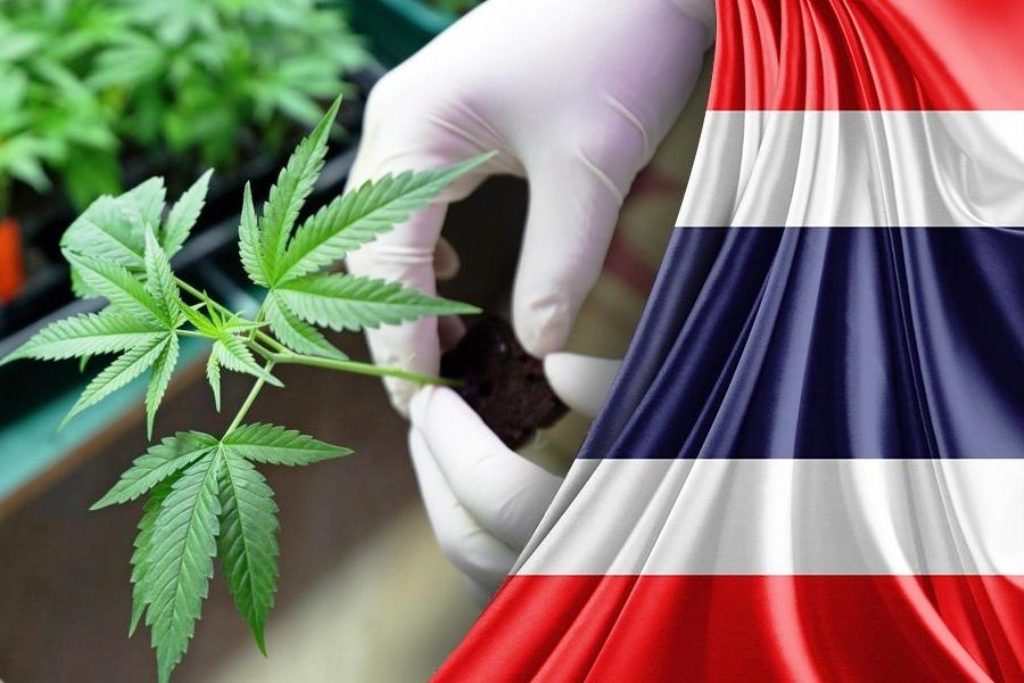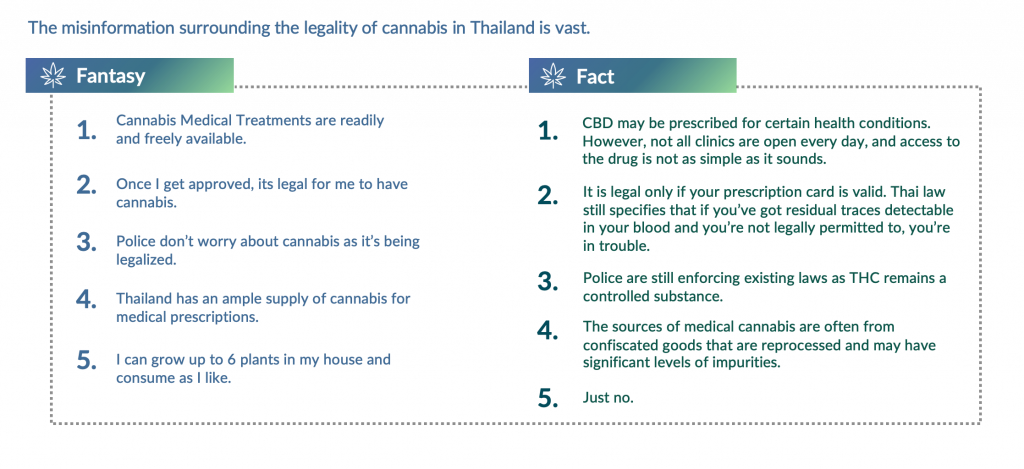Top 5 Myths About Thailand’s Cannabis Laws

Before Thailand decriminalized cannabis, there were plenty of myths about the country’s supposed liberal stance toward the plant.
Thailand’s burgeoning cannabis industry has, unfortunately, misled many investors hoping for radical reform. Despite this, many people still believe that Thailand has adopted a liberal approach to cannabis and has invested billions into a business that is unlikely to exist today.
Those interested in entering the cannabis industry should understand that decriminalizing cannabis does not mean deregulating it.
The recent ministerial announcement, which will take effect in mid-2022, only removes most parts of the cannabis plant from Category 5 of the list of narcotic substances and does not entail a free-for-all on how to use the drug.
As long as THC is present in more than 0.2% by dry weight, it remains illegal to use marijuana for recreation. Cannabis is also subject to strict guidelines on what it can be used for, which is still restricted to medical and research purposes. Another extension to cosmetics and supplements is expected, but regulations have not been finalized.
As a result of current regulations, Thai interests are given a head start in Thailand’s “budding” cannabis industry. Foreign investors and entrepreneurs are therefore faced with additional obstacles to directly engaging in cannabis-related activities, particularly commercial ones.
Hemp is marginally easier to grow
License restrictions include those on the production, cultivation, import, export, and distribution of cannabis, cannabis-based products. Furthermore, foreign companies are currently prohibited from directly participating in any commercial activities involving cannabis until 19 February 2024.
Industrial hemp is marginally easier to grow. The Ministerial Regulation on Application for Licences and Granting of Licences to Produce, Import, Export, Dispose or Possess Narcotics of Category V Concerning Hemp dated 2563 restricts the use of hemp as a drug for commercial or research purposes to Thai citizens or Thai-owned companies.
However, even with these more liberal regulations for industrial hemp, foreign operators still need to go through a rigorous screening process. Authorities look at the stakeholders’ backgrounds, title deeds, operational plans, as well as security and safety procedures.
Additionally, hemp is prohibited from being imported for processing, as well as the use of hemp derivatives is restricted.
Cannabis-infused products
While marketing campaigns have been promoting “marijuana-infused” products, the bottom line is they are mostly based on cannabis terpenes or have CBD at a tiny “naming level” which is unregulated but far below pharmaceutical levels.
In comparison to most of its neighbors in the region, Thailand has been seen as a progressive country in terms of marijuana reform. However, there are restrictions and conditions associated with this, many of which have not been made clear to the hordes of eager investors from North America and elsewhere wanting to recreate the “Green Revolution” in Thailand.
Many entrepreneurs, home-growers, even local farmers have unknowingly fallen victim to unscrupulous projects, including some that are just scams, because of a lack of any real due diligence, especially when travel to Thailand was difficult during COVID-19 restrictions.
After receiving a constant stream of complaints about these scams, the Food and Drug Administration issued a warning that cultivating cannabis, whether medical or otherwise, is heavily regulated and that consumers should be wary of schemes that seem “too good to be true.” marijuana has developed the same hype and playbook as unregulated forestry investment schemes that defrauded many investors.
Cannabis Fact or Fantasy
The problem does not only affect foreigners. Several scams targeted misinformed farmers who believed they could grow cannabis or cannabis seeds for large profits under licenses obtained by others, a violation of current regulations. As a potential cash crop, marijuana has been targeted by the government, but growers are required to comply with a multitude of regulations.
Using this scheme, farmers are either scammed into paying a sub-license fee upfront or misled so that they can be used as “proof of concept” for investment scams.
Among the other schemes is the advanced purchase scam which takes advantage of foreign entrepreneurs wishing to enter the Thai marijuana market quickly.
In these cases, partnerships between foreign entrepreneurs and “authorized” partners involved substantial upfront payments for the build-out of growing facilities, obtaining licenses, or even “bait and switch,” where the “herbal” crop was changed from cannabis to turmeric or ginger after payments were received.
In truth, the marijuana industry has a great deal of potential and will be a major addition to Thailand’s economic development, but early investments carry risks, and keen entrepreneurs need to be cautious.
To prevent one’s money from going “up in smoke,” it is important to conduct thorough due diligence and to know who one is dealing with.
Source: Dr. Paul Crosio
































